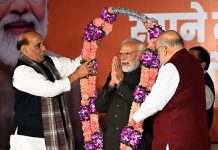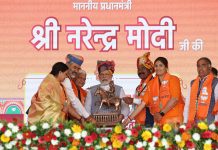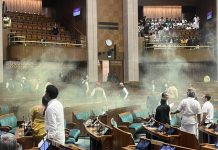 India, which ranks at 142 among 180 countries on the World Press Freedom Index, has become ‘one of the world’s most dangerous countries for journalists and it raises concern, says a latest international report
India, which ranks at 142 among 180 countries on the World Press Freedom Index, has become ‘one of the world’s most dangerous countries for journalists and it raises concern, says a latest international report
It was in the month of March that the Freedom House report titled “Democracy Under Siege” claimed that India’s status as a free country has declined to “partly free” with its score declining to 67 on a scale of 100 and now a month later in April the country has been ranked at 142 among 180 countries and remains as “one of the world’s most dangerous countries” for journalists in the World Press Freedom Index.
The PIB was quick to issue a rebuttal to the Freedom House Report on India’s declining status as a free country describing the Freedom House report as misleading, incorrect, and misplaced.
The rebuttal on the issue of “discriminatory policies against Muslims and North East Delhi riots” said the government of India treats all its citizens with equality as enshrined under the Constitution of the country and all laws are applied without discrimination.
About the use of sedition law, it said that Public Order’ and ‘Police’ are State subjects under India’s federal structure of governance. The responsibility of maintaining law and order, including investigation, registration, and prosecution of crimes, protection of life and property, etc., rests primarily with the concerned State governments. It claimed that the Indian Constitution provides for adequate safeguards under various statutes, including the Protection of Human
Rights Act for ensuring the protection of human rights. Coming to alleged intimidation of academics and journalists, it claimed that the Constitution provides for freedom of expression under Article 19. Discussion, debate, and dissent are part of Indian democracy. However, the latest index ranks India at 142, same as last year, after it had consistently slid down from 133 in 2016. The report said the coordinated hate campaigns waged on social networks against journalists who dare to speak or write are terrifying and include calls for the journalists concerned to be murdered and the “campaigns are particularly violent when the targets are women”.
Further, it said that criminal prosecutions are meanwhile “often used to gag journalists critical of the authorities” with sections for sedition also used. It said, “In 2020, the government took advantage of the coronavirus crisis to step up its control of news coverage by prosecuting journalists providing information at variance with the official position”. It went on to allege that while the pro-government media pump out a form of propaganda, journalists who dare to criticize the government are branded as “anti-state,” “anti-national” or even “pro-terrorist”.
It also stated that this, “exposes” the critical journalists “to public condemnation in the form of extremely violent social media hate campaigns that include calls for them to be killed, especially if they are women”. There was a war on several fronts against reporters and media outlets that don’t toe the official line and the report called the application of “these methods” as “particularly instructive”.
Significantly, the report about India’s status as a democracy and free society titled “Freedom in the World 2021 — Democracy under Siege” had alleged and charged that India “appears to have
abandoned its potential to serve as a global democratic leader”. It said India’s fall “from the upper ranks of free nations could have a particularly damaging impact on global democratic standards”. India had been rated as “free” in Freedom House’s reports for 2018, 2019, and 2020, though its scores on a scale of 100 had declined during this period from 77 to 71. In the latest report, India had a score of 67 out of 100.
In 1973, Freedom House launched the Freedom in the World report, which assessed the level of freedom in each country and ranked them with a numerical score and declared them as “free”, “partly free” or “not free”. The annual report is perceived as one of the oldest quantitative measures of democracy. The latest report said political rights and civil liberties in India had deteriorated since 2014 because of increased pressure on human rights organizations, rising intimidation of academics and journalists, and a “spate of bigoted attacks, including lynchings, aimed at Muslims”.
The decline accelerated in 2019, and the central government and its state-level allies “continued to crack down on critics” during 2020, while the response to the Covid-19 pandemic “included a ham-fisted lockdown that resulted in the dangerous and unplanned displacement of millions of internal migrant workers”.
The Freedom House cited other incidents and developments that had led to the downgrade for India in the latest report, including the government intensifying its crackdown on protesters opposed to the Citizenship (Amendment) Act and the arrest of dozens of journalists who aired criticism of the official pandemic response.
Freedom House gave high scores to India for the conduct of free and fair elections but expressed concern over the “opaque financing of political parties — notably through electoral bonds that allow donors to obscure their identities”. It also gave a low score to India over the ability of different segments of the population, including ethnic, racial and religious minorities, to have full political rights and electoral opportunities. The government’s point-wise rebuttal said that many states in India under its federal structure are ruled by parties other than the one at the national level, through an election process that is free and fair and which is conducted by an independent election body. This reflects the working of a vibrant democracy, which gives space to those who hold varying views.
It said that there is no discriminatory policy against Muslims in India and all citizens are treated with equality. Coming to criticism about the migration of workers, it said that government of India allowed State governments to utilize State Disaster Response Fund for purpose of providing food, healthcare, shelter to homeless persons and migrant workers and allowed the engagement of migrant workers in various activities outside containment zones which would allow them a livelihood and also announced a relief package of 1.7 lakh crore which also covered migrant workers.
About alleged intimidation of journalists, it claimed that the Indian Constitution provides for freedom of expression under Article 19 and the government attaches the highest importance to the safety and security of all residents of the country, including journalists. The Government of India has issued a special advisory to States and Union Territories on the safety of journalists requesting them to strictly enforce the law to ensure the safety and security of media persons. About internet shutdowns, it said that temporary suspension of the telecom services, including internet, are governed under the provisions of the Temporary Suspension of Telecom Services (Public Emergency or Public Safety) Rules and these are temporary suspensions that need authorization.
It should be no consolation that the same report was extremely critical of China, describing it as the “world’s most populous dictatorship” and saying the “malign influence of the regime” in Beijing was “especially profound in 2020”. China “ramped up its global disinformation and censorship campaign to counter the fallout from its cover-up of the initial coronavirus outbreak, which severely hampered a rapid global response in the pandemic’s early days”, the report said. Beijing’s efforts “featured increased meddling in the domestic political discourse of foreign democracies, transnational extensions of rights abuses common in mainland China, and the demolition of Hong Kong’s liberties and legal autonomy”.
tehelkaletters@gmail.com












